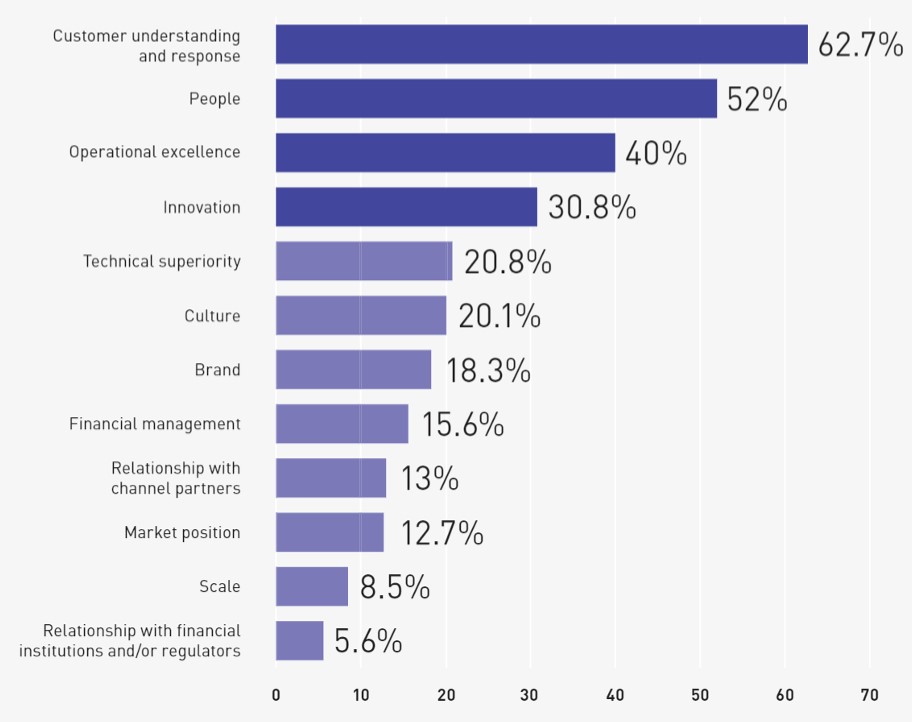
True belief in a customer-led approach
Data from 454 executives suggested they were either customer-led or efficiency-led, but that only the customer-led approach contributed to competitive success.
When asked to name the top three contributors to performance from 12 categories, respondents selected customer understanding and response, people, operational excellence, and innovation most. And the most common combination of “top three” factors were customer understanding and response, operational excellence and people.
Importance of factors contributing to competitive performance

Yet the evidence suggests customers lose out to other, more influential, stakeholders, and to different priorities. While acknowledging the importance of customers, most respondents put customer understanding as just one of many important corporate factors, including product excellence, R&D leadership, scaling, cost cutting and operational improvement.
Analysis suggests two basic mutually exclusive approaches are followed; efficiency or customers.
Important differences emerge between customer-led companies and the rest. The former are characterized by gathering momentum, which over recent years has strengthened employees’ focus on customers; a shared understanding of key customers; an effort to satisfy clearly identified customer segments; an ability to bring customer propositions to market; and a high level of employee engagement.
Customer-led companies remain “focused on the numbers”, contributing to, not detracting, from their performance. Efficiency-led companies focus on the numbers and on lean. But they tend to be less adaptive and less responsive than customer-led ones.
Executives supporting the efficiency-led route may claim customers are one of their top three priorities, but do not experience the superior business performance to prove it. So while managers may claim, and possibly individually believe, customers are among the most important factors for competitive performance, nearly twice as many follow a more finance- and operations-led approach, despite resulting in less satisfactory competitive performance than those prioritizing a customer-led credo.
Download full report “The Belief Trade-off: Customers or Efficiency First?
Research Information & Knowledge Hub for additional information on IMD publications

This episode takes you behind the scenes of a recent gathering led by the World Business Council for Sustainable Development together with IMD, where David Bach sat down with two sustainability leaders.

All organizations should have a plan to secure trust during, after (and even before) a crisis hits. Here are a host of examples, good and bad, to learn from.
In 2024, the management of Aluminium Cyclo Enterprises (ACE), was concerned that the European Union (EU) export rules for ferrous and non-ferrous scrap were becoming more restrictive. Not just the EU, but close to 43 countries had restricted the e...

Tired teams, wasted weekends, and unread reports—here are 7 ways to restore morale and reignite performance. Avoid unnecessary reporting and non-essential tasks.

Explore how innovation, R&D, and policy reforms are reshaping China’s pharmaceutical sector amid rising healthcare demand and demographic shifts.
The Handtmann case examines the co-CEO leadership model in the context of family business. Based on interviews with three key executives – the co-CEOs and the President of the Advisory Board – the case focuses on how Handtmann handled the leadersh...

The 7 shifts you need to make to lead in a turbulent world for acuity and inner rootedness. Grounded Edge Leadership.

Anxiety can sharpen focus, but if it impacts your well-being or leadership, it’s worth a check-in. These helpful questions may help you reflect.

As corporate America adjusts to a shifting political environment under President Donald Trump, companies must rethink their approach to DEI.

Andrew J Hoffman's book explains how Business schools must cultivate leaders who see beyond profits and embrace business as a powerful force for societal good.
Research Information & Knowledge Hub for additional information on IMD publications
in I by IMD
Research Information & Knowledge Hub for additional information on IMD publications
Case reference: IMD-2665 ©2025
Research Information & Knowledge Hub for additional information on IMD publications
in I by IMD
Research Information & Knowledge Hub for additional information on IMD publications
Research Information & Knowledge Hub for additional information on IMD publications
Research Information & Knowledge Hub for additional information on IMD publications
The Handtmann case examines the co-CEO leadership model in the context of family business. Based on interviews with three key executives – the co-CEOs and the president of the advisory board – the case focuses on how Handtmann handled the leadersh...
Research Information & Knowledge Hub for additional information on IMD publications
Research Information & Knowledge Hub for additional information on IMD publications
in I by IMD
Research Information & Knowledge Hub for additional information on IMD publications
in I by IMD
Research Information & Knowledge Hub for additional information on IMD publications

